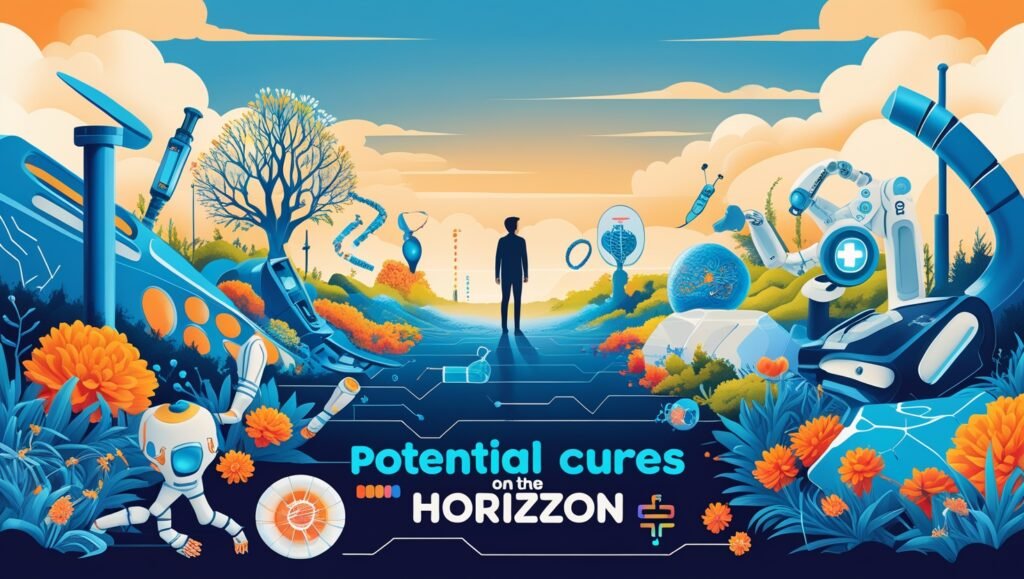Cancer is a journey no one wants to embark upon, yet it’s a path many find themselves traveling. With millions affected worldwide, the quest for new cancer therapies has never been more pressing. Fortunately, the world of oncology advancements is making strides like never before. Researchers and medical professionals are working tirelessly, exploring innovative cancer treatments and potential cures that hold promise for a healthier tomorrow. From cutting-edge technologies to groundbreaking drugs, the future of cancer research is brimming with hope and possibility.
Immunotherapies and Their Impact

Overview of Immunotherapy Approaches
Immunotherapy is an exciting frontier in the fight against cancer. Instead of attacking cancer cells directly, these treatments empower your immune system to do the heavy lifting. Key strategies include:
– Checkpoint Inhibitors: These drugs remove the brakes on immune cells, helping them recognize and attack cancer more effectively.
– CAR T-Cell Therapy: This cutting-edge approach involves genetically altering a patient’s T-cells to better hunt down and destroy cancer cells.
– Cancer Vaccines: Unlike traditional vaccines, these stimulate the immune system to fight against existing cancer cells.
Each of these techniques works by arming the body’s natural defenses, boosting its ability to fend off cancer.
Success Stories in Immunotherapy
Immunotherapy has brought hope and relief to countless patients, with remarkable stories highlighting its potential impact. Many individuals with previously untreatable cancers, like certain types of melanoma and non-small cell lung cancer, have seen their tumors shrink or even disappear entirely. For instance, former President Jimmy Carter’s battle with advanced melanoma that spread to his brain underscores how immunotherapy can lead to remarkable recoveries. These positive outcomes demonstrate not only clinical success but also renewed hope for patients and families.
Challenges and Future Directions
Despite its undeniable promise, immunotherapy isn’t without challenges. Not everyone responds to these treatments, and side effects can sometimes be severe. Researchers are hard at work trying to identify who will benefit most from immunotherapy and why some patients don’t respond.
The future of immunotherapy is bright, with ongoing research focusing on improving efficacy, minimizing side effects, and making these therapies more accessible. Researchers are also exploring combination therapies, using immunotherapy alongside other treatments like chemotherapy and radiation to boost effectiveness.
Personalized Medicine and Targeted Therapies

Understanding Personalized Cancer Treatments
Personalized medicine takes the one-size-fits-all approach and flips it on its head. Rather than treating cancer with a standardized protocol, personalized treatments tailor strategies based on individual patient genetics and tumor characteristics. This approach ensures that therapies are as specific and effective as possible, often resulting in better outcomes and fewer side effects for patients.
Key Targeted Therapies Available
Targeted therapies focus on specific genetic mutations and proteins that cancer cells rely on to grow. Some widely-used examples include:
– HER2 Inhibitors: These drugs are effective against breast and gastric cancers that overproduce the HER2 protein.
– BRAF Inhibitors: Designed for melanoma patients with BRAF gene mutations, these drugs have shown to slow tumor growth.
– EGFR Inhibitors: Used in treating certain lung and colon cancers, these therapies target the epidermal growth factor receptor, crucial in the cancer cell’s life cycle.
These therapies represent a more precise strike, targeting the Achilles heel of cancer cells while sparing healthy tissue.
The Role of Biomarkers in Personalized Medicine
Biomarkers play a crucial role in the development and application of personalized cancer treatment. These biological indicators—often genetic mutations, proteins, or other molecule levels—can predict how a patient might respond to certain therapies. By analyzing these biomarkers, doctors can determine the most effective treatment options, paving the way for truly individualized care.
With advances in biomarker discovery and analysis, personalized medicine is becoming increasingly viable, offering hope for treatments that are not only more effective but also kinder to a patient’s body.
In both immunotherapy and personalized medicine, the potential to revolutionize care and bring us closer to cures is vast. By continuing to innovate and refine these approaches, the future of cancer treatment holds a promise of better outcomes and improved quality of life for patients worldwide.
Advances in Gene Editing for Cancer Treatment

Gene editing has emerged as a promising frontier in the battle against cancer. By directly targeting the genetic errors that drive cancer, scientists are hoping to develop treatments that are both effective and specific. Let’s delve into some of the cutting-edge developments in this exciting field.
CRISPR and Its Applications in Oncology
CRISPR-Cas9 has become a well-known buzzword in recent years, and for good reason. This revolutionary technology acts like a pair of molecular scissors, allowing researchers to cut and edit genes with unprecedented precision. In the world of oncology, CRISPR is being used to:
– Identify and target cancer-driving genes: By knocking out specific genes, researchers can determine their role in cancer development and progression.
– Enhance immune cell function: CRISPR can edit immune cells to make them better at recognizing and attacking cancer cells.
– Develop personalized treatments: By tailoring gene edits to the unique genetic makeup of a patient’s tumor, CRISPR could lead to more individualized therapies.
Ethical Considerations and Potential Risks
While the potential benefits of gene editing are substantial, there are ethical considerations that researchers and clinicians must navigate:
– Off-target effects: The precision of CRISPR is impressive, but it’s not perfect. Accidental edits to non-cancer genes could lead to unintended consequences.
– Long-term impacts: The effects of gene edits may not be fully understood for years, raising concerns about unforeseen health issues.
– Equity in access: As with many cutting-edge treatments, there’s apprehension about who will have access to these therapies and at what cost.
Balancing these risks with the potential benefits is a critical part of the ongoing conversation around gene editing in cancer treatment.
Case Studies of Gene Editing Successes
Despite challenges, there have been notable successes in using gene editing to combat cancer. One such story involves a young patient with leukemia who had exhausted conventional treatment options. Through gene editing, her immune cells were engineered to more effectively target her cancer, ultimately leading to remission. Other cases have shown promising results in solid tumor types, suggesting a broad potential for gene editing across different cancers.
The Role of Artificial Intelligence in Cancer Treatment

Artificial intelligence (AI) is making waves in the medical field, and cancer treatment is no exception. Through complex algorithms and data processing, AI offers promising advancements that could transform how we diagnose and treat cancer.
AI in Early Detection and Diagnosis
One of the most exciting applications of AI in oncology is its potential for early detection. With the ability to analyze vast amounts of data quickly, AI systems can:
– Identify subtle patterns: AI can spot minute changes in imaging that may indicate cancer long before they are visible to the human eye.
– Improve screening accuracy: By reducing false positives and negatives, AI-enhanced screenings lead to earlier and more accurate cancer diagnoses.
– Personalize risk assessments: AI tools can assess individual risks based on genetic, lifestyle, and environmental data, leading to tailored screening strategies.
Machine Learning and Treatment Planning
Machine learning, a subset of AI, is particularly potent in designing optimal treatment plans. Here’s how:
– Analyzing treatment outcomes: By examining large datasets from past patients, machine learning algorithms can predict responses to specific therapies.
– Optimizing drug dosages: AI can tailor drug regimens to individual patient needs, maximizing efficacy while minimizing side effects.
– Adaptive treatment strategies: Algorithms can continuously adjust treatment plans based on real-time patient data, offering a more dynamic approach to cancer care.
Future Potential of AI in Oncology
The future of AI in oncology holds breathtaking possibilities:
– Predictive modeling: AI could forecast cancer progression and patient outcomes, helping doctors make more informed decisions.
– Assisting in drug discovery: By simulating interactions at a molecular level, AI might hasten the discovery of new cancer drugs.
– Augmenting clinical workflows: AI could free up valuable time for healthcare professionals by handling routine diagnostic tasks, allowing them to focus on patient care.
AI’s evolving role in cancer treatment is generating optimism, with each breakthrough bringing us closer to more effective and personalized cancer care.
Potential Cures on the Horizon

As researchers and scientists around the world work tirelessly, the potential cures for cancer are gradually moving from the realm of dreams to reality. It’s a challenging field, but some breakthroughs offer hope. Let’s take a closer look:
Immunotherapy Advancements
One of the most promising areas of research in cancer treatment today is immunotherapy. This innovative approach enhances the body’s immune system to better target and destroy cancer cells. Some exciting developments include:
– CAR-T Cell Therapy: This involves taking a patient’s T-cells, modifying them in a lab to better recognize cancer, and then reintroducing them into the body to fight the disease.
– Immune Checkpoint Inhibitors: These drugs help remove the “brakes” on the immune system, allowing it to attack cancer more forcefully.
Personalized Medicine
Another promising avenue is personalized medicine, which tailors treatment plans to individual patients based on their specific genetic makeup. This approach increases the likelihood of treatment success by targeting therapies that a patient’s unique biology will respond to.
Doctors and researchers are using genomic sequencing to identify mutations leading to cancer. This process enables the development of targeted drugs that combat these specific mutations. Increasingly, treatments rely on:
– Biomarker Testing: Testing for specific genes, proteins, or other molecules to guide treatment decisions.
The Role of AI and Big Data
Artificial Intelligence (AI) and big data are rapidly transforming the landscape of cancer research, speeding up the discovery of new drugs and therapies. By analyzing massive datasets, AI can identify patterns and suggest potential new treatments faster than ever before. This technology has the potential to not only expedite finding cures but also improve early detection and even prevention strategies.
With these new approaches, significant hope emerges in the search for a cancer cure. Continued research and innovation remain crucial, bringing us closer to making cancer a thing of the past.
Conclusion
As we stand on the brink of new frontiers in oncology, the myriad of advancements and potential cures offer a beacon of hope. Innovation is driving us toward more effective, less invasive cancer treatments that aim to improve the quality of life for those battling the disease.
– Personalized Approaches: These therapies bring the promise of treatments tailored specifically to individual genetic profiles.
– Targeted Treatments: These hone in on cancer cells, sparing healthy ones, reducing side effects.
Continued research and development in cancer treatments are essential. With each discovery, we move closer to transforming cancer into a manageable condition and, hopefully, unlocking permanent cures. The fight against cancer is far from over, but with these groundbreaking strides, the future looks brighter than ever.



